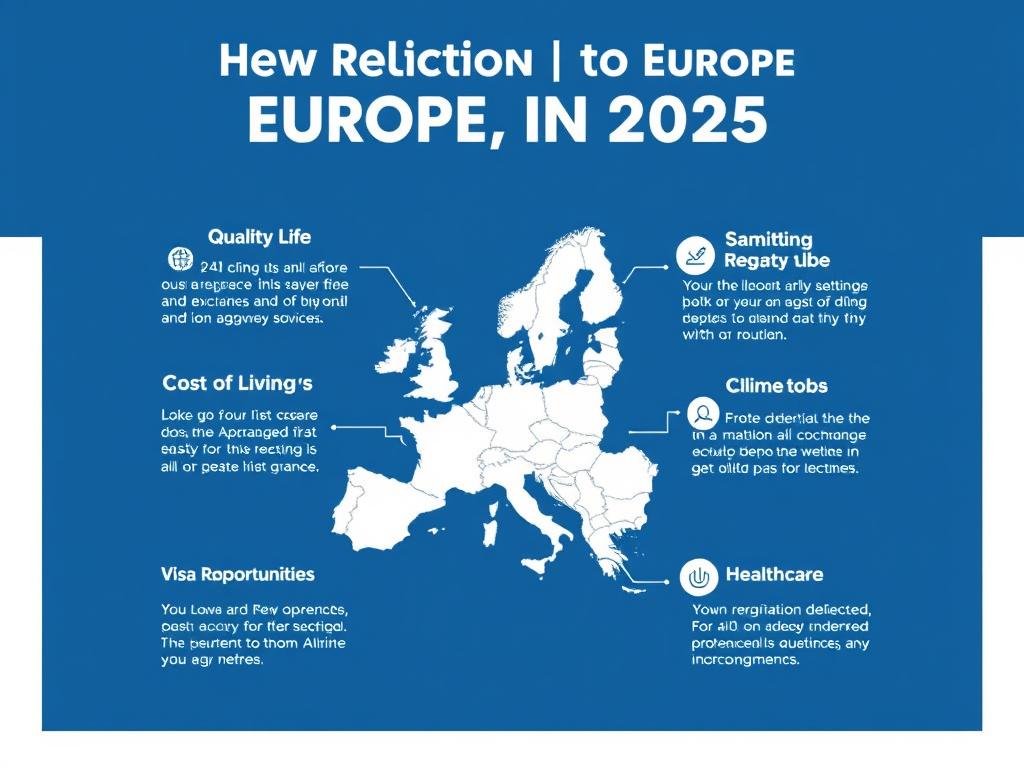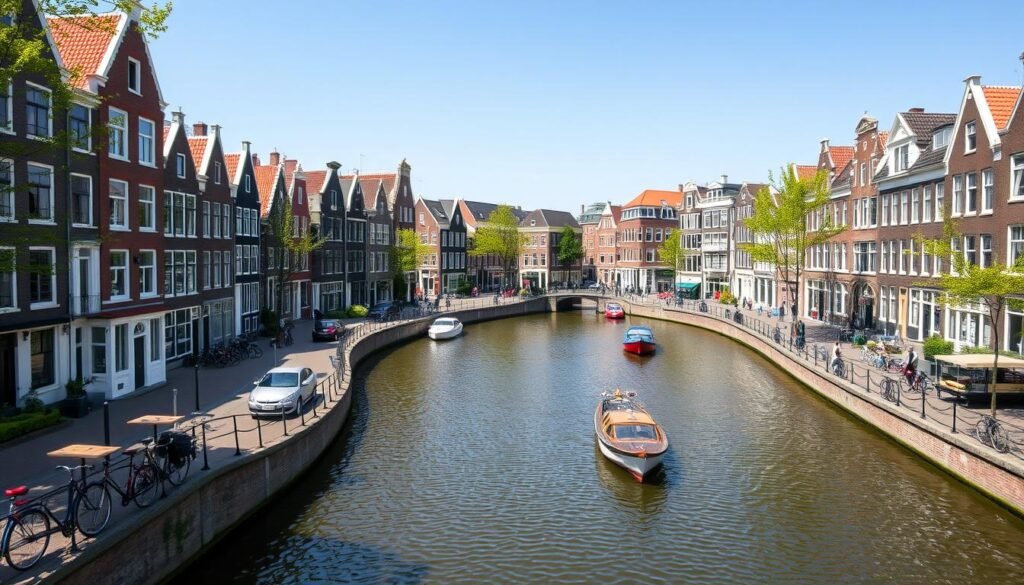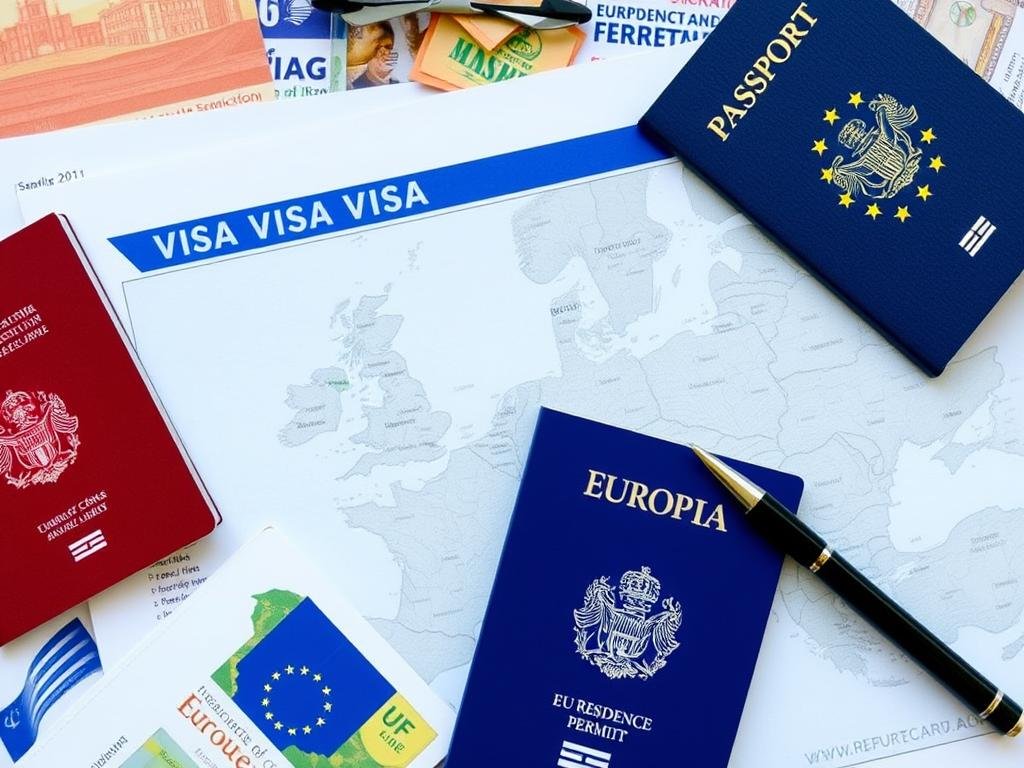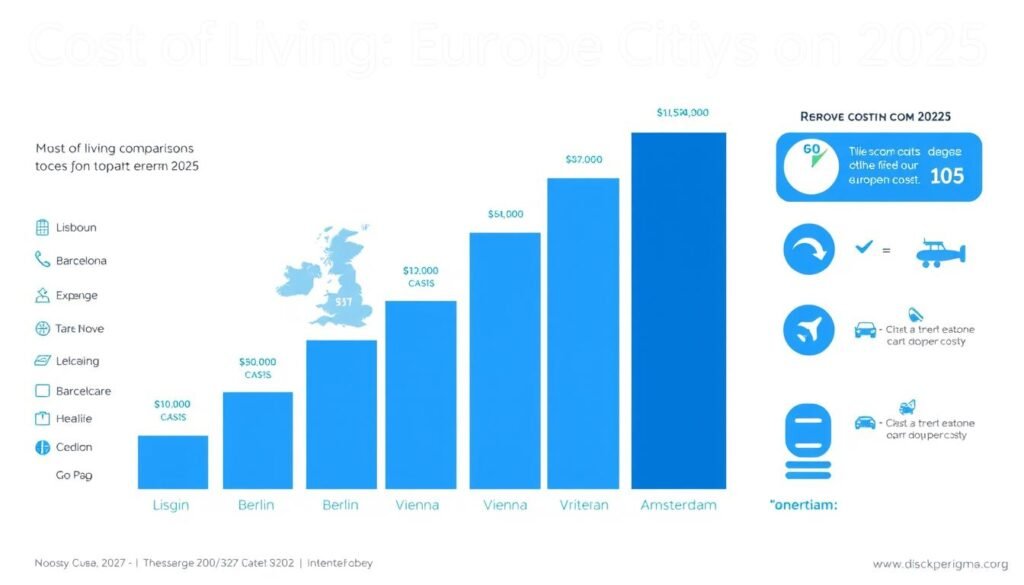Considering a move to Europe in 2025? Whether you’re seeking better quality of life, new career opportunities, or simply a change of scenery, choosing the right European destination is crucial for a successful relocation. This comprehensive guide examines the best places to live in Europe 2025, analyzing everything from cost of living and visa requirements to healthcare systems and expat communities.
Europe continues to attract expats from around the world with its diverse cultures, excellent infrastructure, and high standards of living. However, each country offers distinct advantages depending on your priorities – whether that’s affordable housing, career growth, family-friendly environments, or digital nomad-friendly policies.
Key Factors to Consider When Choosing Where to Live in Europe
Before diving into specific destinations, it’s important to understand the key factors that make a location suitable for relocation. These criteria will help you evaluate each potential destination based on your personal circumstances and priorities.
Quality of Life Indicators
- Healthcare system quality and accessibility
- Education standards and international schools
- Public transportation infrastructure
- Safety and crime rates
- Environmental quality and green spaces
- Cultural and recreational opportunities
Practical Considerations
- Cost of living (housing, food, utilities)
- Job market and career opportunities
- Visa and residency requirements
- Language barriers and English proficiency
- Digital infrastructure and remote work support
- Tax implications for expats

Not Sure Where to Start?
Download our free Relocation Priority Checklist to help identify which factors matter most for your European move.
Top 10 Best Places to Live in Europe 2025
Based on comprehensive analysis of quality of life metrics, economic opportunities, expat satisfaction surveys, and future outlook, these are the top European destinations for relocation in 2025. Each offers a unique blend of advantages depending on your lifestyle preferences and priorities.
1. Lisbon, Portugal

Lisbon continues to top the list of best places to live in Europe 2025, particularly for digital nomads and remote workers. The city offers an exceptional blend of affordability, quality of life, and Mediterranean charm. Portugal’s Digital Nomad Visa program has made it even more attractive for location-independent professionals.
Key Benefits:
- Affordable cost of living compared to other Western European capitals
- Excellent climate with 300+ days of sunshine annually
- Strong digital infrastructure and co-working spaces
- Attractive tax benefits through the Non-Habitual Resident scheme
- High English proficiency among locals
Pros
- Favorable Digital Nomad Visa program
- Vibrant expat community
- Excellent public transportation
- Rich cultural scene and gastronomy
Cons
- Rising housing costs in city center
- Tourist congestion in popular areas
- Limited career opportunities in certain sectors
- Bureaucracy can be challenging
2. Barcelona, Spain

Barcelona continues to be one of the best places to live in Europe 2025, especially for those seeking a perfect balance between urban amenities and Mediterranean lifestyle. Spain’s digital nomad visa introduced in 2023 has made it even more accessible for remote workers looking to enjoy the city’s unique blend of culture, architecture, and coastal living.
Key Benefits:
- Perfect climate with mild winters and warm summers
- Excellent public transportation and walkability
- Rich cultural heritage and world-class architecture
- Strong tech and startup ecosystem
- City beaches and easy access to Costa Brava
Pros
- Excellent healthcare system
- Vibrant international community
- Rich cultural and culinary scene
- Good work-life balance
Cons
- High housing demand in desirable areas
- Overtourism in peak seasons
- Catalan language can be a barrier
- Lower salaries compared to Northern Europe
3. Berlin, Germany

Berlin remains one of the best places to live in Europe 2025 for creative professionals, entrepreneurs, and those seeking an affordable yet vibrant European capital. Despite its growing popularity, Berlin maintains relatively affordable living costs compared to other major European cities while offering exceptional cultural diversity and a thriving startup ecosystem.
Key Benefits:
- More affordable housing than other major European capitals
- Excellent public transportation network
- Thriving startup and tech ecosystem
- Diverse international community
- Rich cultural scene and nightlife
Pros
- Strong job market for tech professionals
- Excellent work-life balance
- Abundant green spaces and parks
- Progressive and open-minded atmosphere
Cons
- Cold, dark winters
- German bureaucracy can be challenging
- Language barrier in some professional settings
- Housing market becoming more competitive
Need Personalized Relocation Advice?
Our experts can help you determine which European city best matches your lifestyle, budget, and career needs.
4. Vienna, Austria

Vienna consistently ranks among the best places to live in Europe 2025 and globally for quality of life. The Austrian capital offers an unmatched combination of imperial grandeur, modern efficiency, cultural richness, and exceptional public services. For families and professionals seeking stability and high living standards, Vienna presents a compelling option.
Key Benefits:
- Exceptional public transportation system
- World-class healthcare and education
- Abundant green spaces and recreational areas
- Rich cultural heritage and arts scene
- Clean, safe environment with low crime rates
Pros
- Excellent family-friendly infrastructure
- Strong social security system
- Central European location for travel
- Beautiful architecture and urban planning
Cons
- Higher cost of living than Eastern Europe
- German language proficiency often required
- Conservative business culture
- Can feel formal compared to Mediterranean cities
5. Amsterdam, Netherlands

Amsterdam continues to be one of the best places to live in Europe 2025, particularly for international professionals and expats. The Dutch capital offers an exceptional quality of life with its picturesque canals, cycling culture, and progressive outlook. The Netherlands’ excellent English proficiency makes it one of the easiest non-English speaking countries for expats to integrate into.
Key Benefits:
- Excellent English proficiency throughout the city
- Strong job market for international professionals
- Exceptional cycling infrastructure
- Progressive social policies and healthcare
- Central location for European travel
Pros
- Thriving international business community
- Excellent public transportation
- Rich cultural offerings and museums
- Strong digital infrastructure
Cons
- Very competitive housing market
- High cost of living and taxes
- Rainy, unpredictable weather
- Tourist congestion in city center
Visa and Residency Options for Living in Europe 2025
Navigating visa requirements is a crucial step when planning to relocate to Europe. Depending on your nationality, profession, and financial situation, several pathways to legal residency are available. Here’s an overview of the most accessible visa options for those looking to live in Europe in 2025.

Digital Nomad Visas
Digital nomad visas have become increasingly popular across Europe, offering remote workers the opportunity to legally reside while working for employers or clients outside the host country. These visas typically require proof of stable income and comprehensive health insurance.
| Country | Visa Name | Duration | Income Requirement | Processing Time | Tax Benefits |
| Portugal | Digital Nomad Visa | 1 year (renewable) | €2,800/month | 30-60 days | NHR scheme available |
| Spain | Digital Nomad Visa | 1 year (renewable) | €2,300/month | 20-30 days | Special 24% flat rate |
| Croatia | Digital Nomad Residence | 1 year (renewable) | €2,500/month | 15-30 days | Foreign income exempt |
| Greece | Digital Nomad Visa | 1 year (renewable) | €3,500/month | 10-30 days | 50% tax exemption |
| Italy | Digital Nomad Visa | 1 year (renewable) | €28,000/year | 30-90 days | Flat tax options |
Investment and Golden Visas
For those with significant financial resources, investment-based residency programs offer a streamlined path to living in some of the best places in Europe. These programs typically require real estate purchases, business investments, or government bond acquisitions.
| Country | Program Name | Minimum Investment | Path to Citizenship | Processing Time |
| Portugal | Golden Visa | €500,000 (real estate) | 5 years | 6-8 months |
| Greece | Golden Visa | €250,000 (real estate) | 7 years | 2-3 months |
| Spain | Golden Visa | €500,000 (real estate) | 10 years | 2-3 months |
| Malta | Permanent Residence Programme | €175,000 (bonds) + property | 5 years | 4-6 months |
| Ireland | Investor Programme | €1,000,000 (investment fund) | 5 years | 6-9 months |
Need Expert Visa Guidance?
Our immigration specialists can help determine the best visa pathway for your specific situation and guide you through the application process.
Work and Skilled Migration Visas
For professionals looking to work in Europe, several countries offer streamlined visa processes for skilled workers in high-demand sectors. These pathways often lead to permanent residency and eventually citizenship.
EU Blue Card
The EU Blue Card is designed for highly qualified non-EU nationals seeking employment in Europe. Key requirements include:
- Higher education qualification or 5+ years of professional experience
- Employment contract with salary at least 1.5 times the average gross annual salary
- Valid for up to 4 years (renewable)
- Path to permanent residency after 5 years
Country-Specific Skilled Worker Visas
Many European countries have developed specialized visa programs to attract talent in specific sectors:
- Germany: Skilled Immigration Act visa for qualified professionals
- Ireland: Critical Skills Employment Permit for high-demand occupations
- Netherlands: Highly Skilled Migrant Program
- Sweden: Work Permit for in-demand professionals
Cost of Living Comparison: Best Places to Live in Europe 2025
Understanding the cost of living is essential when choosing where to relocate in Europe. Housing, transportation, food, healthcare, and entertainment expenses can vary dramatically between countries and even cities within the same country.

Monthly Budget Breakdown (Average for a Single Person)
| City | Rent (1BR, City Center) | Utilities | Groceries | Transportation | Dining Out | Total Monthly |
| Lisbon | €900 | €120 | €250 | €40 | €300 | €1,610 |
| Barcelona | €1,000 | €150 | €280 | €50 | €350 | €1,830 |
| Berlin | €1,100 | €200 | €300 | €86 | €350 | €2,036 |
| Vienna | €950 | €180 | €300 | €50 | €330 | €1,810 |
| Amsterdam | €1,700 | €180 | €350 | €100 | €400 | €2,730 |
| Prague | €750 | €150 | €200 | €25 | €250 | €1,375 |
| Valencia | €700 | €130 | €250 | €40 | €300 | €1,420 |
Housing Market Insights
Housing typically represents the largest expense for expats relocating to Europe. Here’s what you need to know about the 2025 housing market in top European destinations:
Southern Europe
Countries like Portugal, Spain, and Greece offer more affordable housing options, especially outside major city centers. Portugal’s interior regions and Spain’s smaller cities provide excellent value for money with prices 30-50% lower than capital cities.
Trend: Growing demand in secondary cities like Porto, Valencia, and Thessaloniki as remote workers seek lower costs with high quality of life.
Central Europe
Germany, Austria, and the Czech Republic present a mixed picture. While Berlin’s prices continue to rise, they remain lower than Munich or Vienna. Prague offers excellent value but prices are increasing as more expats discover its benefits.
Trend: Strong tenant protection laws in Germany and Austria make long-term renting a viable alternative to buying.
Northern Europe
The Netherlands, Denmark, and Sweden have some of Europe’s highest housing costs, particularly in Amsterdam, Copenhagen, and Stockholm. However, these countries offer excellent public services and infrastructure in return.
Trend: Growing interest in satellite cities like Utrecht, Aarhus, and Malmö as affordable alternatives to capital cities.
Get Your Personalized Cost of Living Report
Our detailed calculator compares your current expenses with projected costs in your target European destination.
Quality of Life Factors in the Best Places to Live in Europe 2025
Beyond cost considerations, quality of life factors significantly influence relocation decisions. European cities consistently rank among the world’s best for overall livability, but important differences exist between regions and countries.

Healthcare Systems
Access to quality healthcare is a crucial consideration when relocating. European countries offer varying healthcare models, from fully public systems to hybrid public-private arrangements.
| Country | Healthcare Model | Quality Ranking | Expat Access | Out-of-Pocket Costs |
| France | Universal public-private | 1st in Europe | After 3 months residency | Low (30% co-pay, reimbursable) |
| Spain | National health service | 7th in Europe | With residency/work permit | Very low |
| Germany | Statutory health insurance | 3rd in Europe | Mandatory insurance | Moderate (insurance-based) |
| Portugal | National health service | 12th in Europe | With residency | Low |
| Netherlands | Private insurance (mandatory) | 2nd in Europe | Mandatory insurance | Moderate (€385 deductible) |
Safety and Security
Europe generally offers high levels of safety and security, with low violent crime rates compared to many other regions. However, petty crime and safety perceptions can vary significantly between cities and neighborhoods.
Safest European Countries 2025
- Iceland
- Denmark
- Austria
- Portugal
- Slovenia
- Switzerland
- Finland
- Norway
- Ireland
- Netherlands
Safety Considerations for Expats
- Tourist areas in major cities may have higher rates of pickpocketing
- Northern European countries typically have lower crime rates but higher costs
- Southern European cities may have more petty theft but very low violent crime
- Eastern European EU members have seen significant safety improvements
- Rural areas generally have lower crime rates than urban centers
Work-Life Balance
Europe is renowned for prioritizing work-life balance, with shorter working hours, generous vacation policies, and strong worker protections compared to many other regions.

| Country | Average Working Hours/Week | Minimum Paid Vacation | Parental Leave | Work-Life Balance Ranking |
| Denmark | 37.0 | 25 days + holidays | 52 weeks shared | 1st |
| Netherlands | 38.0 | 20 days + holidays | 16 weeks maternal, 6 weeks paternal | 2nd |
| Spain | 40.0 | 22 days + holidays | 16 weeks each parent | 4th |
| Germany | 39.5 | 20 days + holidays | 14 months shared | 6th |
| France | 39.0 | 25 days + holidays | 16 weeks maternal, 28 days paternal | 7th |
Best Digital Nomad Hubs in Europe 2025
The rise of remote work has transformed many European cities into thriving digital nomad destinations. These locations offer the perfect blend of connectivity, community, affordability, and lifestyle benefits for location-independent professionals.

Lisbon, Portugal
Portugal’s capital has become Europe’s digital nomad capital, offering an unbeatable combination of affordable living costs, excellent infrastructure, and vibrant community. The city’s dedicated digital nomad visa makes it easy to establish legal residency.
Highlights:
- 300+ days of sunshine annually
- 50+ co-working spaces
- Strong English proficiency
- Active expat and nomad communities
- Excellent public transportation
Valencia, Spain
Spain’s third-largest city offers the perfect balance of big-city amenities and relaxed Mediterranean lifestyle at significantly lower costs than Barcelona or Madrid. Spain’s digital nomad visa program has made it increasingly popular with remote workers.
Highlights:
- 30% lower cost than Barcelona
- Beach lifestyle with urban amenities
- Growing tech and startup scene
- Excellent climate year-round
- High-speed rail connections
Berlin, Germany
Berlin remains a magnet for creative digital nomads drawn to its unique cultural scene, affordability (by German standards), and excellent infrastructure. The city’s international atmosphere and English proficiency make integration easy.
Highlights:
- Thriving startup ecosystem
- 100+ co-working spaces
- Vibrant arts and music scene
- Excellent public transportation
- Strong international community
Split, Croatia
This coastal gem has emerged as one of Europe’s most appealing digital nomad destinations, combining Adriatic beauty with solid infrastructure and Croatia’s dedicated digital nomad visa program.
Highlights:
- Affordable Mediterranean lifestyle
- Growing nomad community
- Excellent internet connectivity
- Beautiful coastal setting
- Lower cost than Dubrovnik
Tallinn, Estonia
Estonia’s digital-first approach to governance makes it uniquely appealing to tech-savvy nomads. The country’s e-Residency program and Digital Nomad Visa offer innovative solutions for remote workers.
Highlights:
- World-leading digital infrastructure
- E-Residency program
- Startup-friendly environment
- Beautiful medieval old town
- High English proficiency
Athens, Greece
Greece’s capital has reinvented itself as a digital nomad hub, offering an attractive combination of history, affordability, and Mediterranean lifestyle. The Greek digital nomad visa provides a straightforward path to residency.
Highlights:
- Lower cost than island destinations
- Excellent climate year-round
- Rich historical surroundings
- Growing co-working scene
- Easy access to islands
Digital Nomad Starter Kit
Get our comprehensive guide to establishing yourself as a digital nomad in Europe, including visa comparisons, co-working recommendations, and community resources.
Ultimate Relocation Checklist for Moving to Europe in 2025
Planning an international move requires careful preparation and organization. This comprehensive checklist covers the essential steps to ensure a smooth transition to your new European home.

6-12 Months Before Moving
- Research visa requirements for your target country and begin the application process
- Explore housing options and understand the rental or purchasing process
- Research healthcare systems and determine insurance requirements
- Calculate cost of living and prepare a realistic budget
- Research tax implications of your move and consult with an international tax advisor
- Begin learning the local language if necessary
3-6 Months Before Moving
- Secure your visa or residence permit
- Find accommodation (temporary or permanent)
- Research international moving companies and get quotes
- Notify current landlord if renting
- Research banking options in your destination country
- Arrange for health insurance coverage in your new location
1-3 Months Before Moving
- Book international movers or shipping services
- Begin sorting possessions (sell, donate, store, or take)
- Gather important documents (birth certificates, marriage certificates, academic records)
- Arrange for document translations if required
- Research mobile phone plans in your destination
- Set up mail forwarding
Final Month Before Moving
- Close or transfer utility accounts
- Notify important institutions of your move (banks, insurance, etc.)
- Schedule final medical and dental check-ups
- Obtain necessary medications and medical records
- Confirm all travel arrangements
- Pack essential items for your first weeks
First Week After Arrival
- Register with local authorities if required
- Open a local bank account
- Obtain a local phone number
- Register with healthcare providers
- Explore your neighborhood and locate essential services
- Connect with expat communities or local groups
Get Your Personalized Relocation Plan
Our relocation specialists can create a customized timeline and checklist based on your specific destination, family situation, and needs.
Frequently Asked Questions About Living in Europe
Here are answers to some of the most common questions about relocating to Europe in 2025.
Which European countries are easiest to relocate to in 2025?
Portugal, Spain, and Estonia currently offer the most accessible pathways for relocation, especially for digital nomads and remote workers. Portugal’s D7 visa and digital nomad visa are particularly popular for their relatively straightforward requirements and processing. For entrepreneurs, Estonia’s startup visa and e-Residency program provide innovative options. Countries in Eastern Europe like the Czech Republic and Poland also offer more accessible residence permits for certain professionals.
Is healthcare free in European countries?
Healthcare systems vary across Europe. While many European countries offer universal healthcare, it’s not always entirely “free.” Most systems are funded through taxation or mandatory insurance contributions. As a legal resident, you’ll typically have access to the public healthcare system after fulfilling certain requirements (such as making social security contributions). Some countries like France operate on a reimbursement model, while others like the UK and Spain provide services without upfront payment. Private health insurance is recommended during initial transition periods and sometimes required for visa applications.
What are the tax implications of moving to Europe?
Tax implications vary significantly between European countries. Some countries like Portugal offer special tax regimes for new residents (Non-Habitual Resident scheme) with significant tax benefits for certain income types. Others like France have higher tax rates but provide extensive social benefits. Most European countries determine tax residency based on the 183-day rule (if you spend more than 183 days in the country, you’re typically considered a tax resident). It’s essential to understand concepts like tax residency, double taxation treaties, and country-specific deductions. Consulting with an international tax advisor before relocating is highly recommended.
Can I work remotely from Europe for a non-European company?
Yes, many European countries now offer specific visas for remote workers employed by non-European companies. Portugal, Spain, Croatia, Greece, and Estonia have introduced digital nomad visas specifically designed for this arrangement. These visas typically require proof of stable income from foreign sources, comprehensive health insurance, and sometimes minimum income thresholds. However, tax implications can be complex, as you may become tax resident in your European country of residence while receiving income from abroad. Some countries offer special tax arrangements for this situation, but proper planning is essential.
Which European cities offer the best quality of life for families?
Vienna, Copenhagen, Munich, Zurich, and Helsinki consistently rank among the best European cities for families. These cities offer excellent public education, comprehensive healthcare, abundant green spaces, low crime rates, and family-friendly infrastructure. Medium-sized cities like Valencia (Spain), Porto (Portugal), and Utrecht (Netherlands) provide a good balance of urban amenities and more relaxed lifestyle at lower costs. Key factors to consider include education options (international schools vs. local schools), childcare availability, family benefits, and outdoor recreation opportunities.
How difficult is it to buy property in Europe as a foreigner?
Property purchase regulations for foreigners vary across Europe. Most EU countries allow foreigners to buy property with few restrictions, though some have limitations in certain areas. Portugal, Spain, and Greece are particularly open to foreign buyers and offer residency through real estate investment (Golden Visa programs). Some countries like Switzerland and Denmark have significant restrictions on non-resident purchases. Financing can be challenging for new arrivals without local credit history, though some banks offer international buyer programs. Transaction costs (notary fees, taxes, agent commissions) typically range from 5-15% of the purchase price depending on the country.
Finding Your Ideal European Home in 2025
Choosing the best place to live in Europe is a deeply personal decision that depends on your unique priorities, lifestyle preferences, and circumstances. Whether you’re drawn to the Mediterranean warmth of Portugal and Spain, the efficiency and cultural richness of Central Europe, or the progressive social systems of Scandinavia, Europe offers incredible diversity within relatively short distances.
As remote work continues to reshape how and where we live, European countries are increasingly competing to attract international talent through streamlined visa processes, tax incentives, and improved digital infrastructure. This creates unprecedented opportunities for those looking to experience the European lifestyle in 2025 and beyond.
The key to a successful relocation lies in thorough research, careful planning, and realistic expectations. By understanding the practical aspects of your move—from visa requirements and cost of living to healthcare access and cultural integration—you’ll be well-prepared to make the most of your European adventure.
Ready to Start Your European Journey?
Our relocation experts can help you navigate every step of the process, from choosing the perfect destination to settling into your new home.

